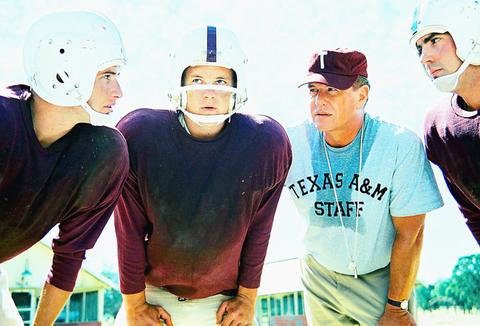Like every American who has followed football, Tom Berenger knew the name Bear Bryant, the man who made winners of teams at Maryland, Kentucky, Texas A&M and Alabama. "But I'm not sure I knew exactly what I was getting into when I decided to do The Junction Boys, Berenger said. "It's like messing with someone's interpretation of God."
A God in progress would be a more accurate description of the Paul "Bear" Bryant played by Berenger in the ESPN film The Junction Boys, made from Jim Dent's 1999 book. This Bryant was not yet the national figure he would become at Alabama, where he won six national championships.

PHOTO: NY TIMES
In 1954 he had just left the University of Kentucky, disgruntled after a power struggle with the legendary basketball coach Adolph Rupp. The head coaching job at Texas Agriculture and Military was not the most sought after in the country; as Dent wrote of the all-male, all-military institution, "It looked like a penitentiary, boasted the color scheme of a grocery bag and possessed all of the glamor of a stock show." Bryant, determined to make his mark, would show the military school what real discipline was.
Loading 111 players into two buses, he took the team to Junction, a small town half a day's ride from the campus, where A&M had an agricultural and engineering facility. (The film was shot in Australia, whose outback in the fall is a dead ringer for west Texas during the summer.) For 10 days, away from the prying eyes of press, alumni and parents, he put his players through a regimen that Jack Pardee, a future National Football League player and coach, called "hell, without the frills."
"We regularly worked out in 114 heat," said Pardee, an all-America linebacker at Texas A&M. "You'll hear people today say it was 120, but there is no need to exaggerate."
The players went through workouts for eight hours at a time with no water, and went without food for even longer stretches.
Cuts, bruised ribs and dislocated shoulders were all treated the same way -- with ice packs, when ice was available. One player nearly died of dehydration, and many more thought they would.
Up the junction
Two buses carried the players to the Junction; only one was needed to carry them back. Two-thirds of the team quit during those 10 days, most of them sneaking away in the night. The 35 who stayed endured even more misery during the 1954 season, winning just one game and losing nine, but they became the nucleus of a legendary 1956 team that went unbeaten and gained national recognition.
The team's eventual success on the field is far from the whole story, however. Bryant, the 11th of 12 children, had picked cotton as a boy to help feed his family and clawed his way through the Depression on a football scholarship at Alabama, where he was the "other end" on a team with Don Hutson, who would have a Hall of Fame career with the Green Bay Packers.
For Bryant, football was less a game than a means of survival. It took him years to understand that his methods for producing winning teams might have been unfair, even dangerous. In time, he came to repudiate his own tactics and not only forgave players who quit, but also sought their forgiveness.
To one player who had walked out on him at A&M, Bryant later wrote, "I was so glad to read about your successful and happy life there in California.
"I've made a lot of mistakes in my life with the young men I have coached. But the greatest mistake I ever made was with you."
Unfortunately, the success of Bryant's training regimen came to be much better known in football than his own later condemnation of it. Fifteen years after Texas A&M'S championship team, the Virginia high school coach Herman Boone, subject of the film Remember the Titans and a Bryant admirer, was busing his team to a remote training camp and depriving his players of water during workouts.
Many attribute the death last season of the Minnesota Vikings star Korey Stringer to the same kind of practice routines that coaches like Bryant had long ago denounced.
Orley Adelson, the executive producer of the film, said she had only a vague idea of who Bear Bryant was before she was handed a copy of Dent's book. On reading it, she said, she immediately saw that "this was much more than a story of athletes achieving their own potential because of a great disciplinarian."
"It is also about a man of action who comes to question the very methods which brought him success," she continued. "It's about a man who comes to find his own limits."
In fact, the film, which was written and directed by the television veteran Mike Robe (Return to Lonesome Dove), begins with Bryant in a moment of severe self-doubt immediately after his greatest triumph, a 1979 New Year's Day victory over Joe Paterno's Penn State team that gave Bryant his fifth national championship. He is traveling to the 25th anniversary reunion of the so-called "Junction Boys," not knowing how the players he drove so relentlessly will receive him.
Evolution
"What's truly great about this script is that you can see Coach Bryant change and evolve," said Berenger. "I don't really believe he was a great coach at the time of the Junction. I believe he became a great coach because of what he went through there. He changed as much as the boys he coached."
Perhaps because he has become such a dominant figure in college football, Bryant has, up to now, eluded filmmakers.
`The bear'
A truly awful 1984 biopic, The Bear, starring a miscast Gary Busey, quickly slipped into oblivion. The coach's only other screen appearance was a brief comic walk-on in Forrest Gump, in which he was unnamed, except in the credits [he was played by the character actor Sonny Shroyer], and identified only by his traditional houndstooth checked hat.
George Bodenheimer, president of ESPN, said he hoped that The Junction Boys would be an exception -- the latest one -- to the Hollywood adage that "sports movies don't sell."
"They must sell to someone," Bodenheimer said, "because they've been making them as long as they've been making movies. In fact, Americans have always loved good movies with sports themes. It's just that most movie studios don't know how to reach that audience today."
Bodenheimer said that ESPN's production of sports-related films like The Junction Boys and the recent A Season on the Brink, about the former Indiana University basketball coach Bob Knight, was "a natural growth" for the sports cable channel.
"Who was it that said, `Sports are merely unscripted drama'?" Bodenheimer asked. "All we're trying to do now is find the best stories and put a script to them."

Inter’s defense of their Italian Serie A title was hit with a setback on Sunday as they lost 1-0 at home to AS Roma, while Scott McTominay netted a brace as SSC Napoli beat Torino 2-0 to go top of the table. No fixtures were played on Friday or Saturday because of the funeral of Pope Francis in Rome, meaning the full round of Serie A matches took place on Sunday and yesterday. Matias Soule’s first-half strike for Roma knocked Inter off top spot earlier in the day before new Napoli opened up a three-point buffer with victory in Sunday’s

Ethiopia’s Tigst Assefa yesterday set a women’s only world record of 2 hours, 15 minutes, 50 seconds as she won the London Marathon, while Kenya’s Sabastian Sawe put a star-studded men’s field to the sword. For 28-year-old Assefa it was ample compensation for finishing runner-up in London and the Paris Olympics last year — especially as bitter Dutch rival, the Ethiopia-born Sifan Hassan, finished third. Assefa dropped Kenya’s Joyciline Jepkosgei as the race, played out in blazing sunshine and with thousands lining the route, entered its business end. She came home almost three minutes clear of the Kenyan. Hassan, who beat her in

FOCUS: ‘We came out here with a goal in mind ... to keep our foot on their throat and on their neck, and continue to play 48 minutes of basketball,’ Donovan Mitchell said The Cleveland Cavaliers on Monday thrashed the Miami Heat to cruise into the next round of the NBA playoffs as the Golden State Warriors battled past the Houston Rockets 109-106 to move to the brink of a series victory. After pounding Miami 124-87 in game three on Saturday, No.1 Eastern Conference seeds Cleveland once again piled on the misery for their outclassed opponents with a crushing 138-83 victory to complete a 4-0 series win. The 55-point drubbing was the largest series-clinching victory in NBA playoff history and sets up a series against either the Indiana Pacers or Milwaukee Bucks in

Canadian actor Ryan Reynolds said it felt like an “impossible dream” when fellow Hollywood A-lister Rob McElhenney first floated the idea of buying soccer club Wrexham, along with a pitch for a documentary. The ultimate goal was reaching the Premier League. Four years after they purchased the north Wales outfit, Wrexham are one league away from achieving their lofty goal after a 3-0 win over Charlton Athletic on Saturday saw them promoted for a record third consecutive time. “We were standing there doing a press conference four years ago, and said our goal is to make it to the Premier League, and